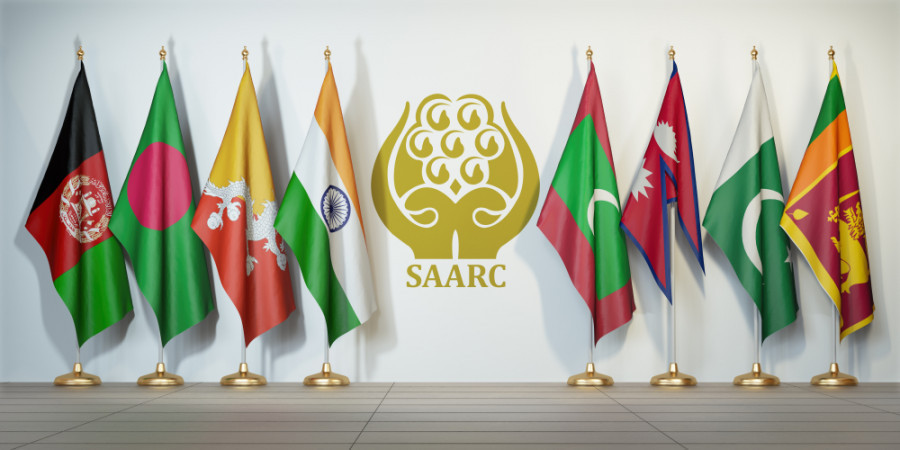National
SAARC foreign ministers meet virtually and reiterate commitment to regionalism
India and Pakistan’s animosity has held the regional grouping hostage and although both expressed their commitment to a connected and effective grouping, uncertainty over the 19th summit remains.
Anil Giri
Amid uncertainty over its future direction, South Asian Association for Regional Cooperation member states have once again renewed their commitment to expediting the stalled regional process, a familiar refrain in subcontinental affairs. And they failed to reach any understanding when and how it can be reinvigorated and when the next summit will be held.
During a virtual meeting of SAARC foreign ministers, both India and Pakistan, whose rivalry has been the stumbling block for the regional bloc’s progress, called for a connected and effective regional mechanism.
“India wants to build a connected, integrated, secure and prosperous South Asia,” said India’s Minister for External Affairs S Jaishanker.
He, however, also added that cross-border terrorism, blocking connectivity and obstruction to trade are three key challenges that SAARC must overcome.
India has been accusing Pakistan of cross-border terrorism in the disputed Kashmir region and elsewhere and this has led the two nuclear powers to loggerheads over any continued regional cooperation.
Pakistan Foreign Minister Shah Mahmood Qureshi, in his turn, remarked that artificial obstructions were being created to hinder regional cooperation.
"We hope that the artificial obstacles created in its way would be removed and SAARC would be enabled to function as an effective instrument of regional cooperation,” said Quereshi.
While foreign ministers of the member nations were seated with their respective countries’ delegations, the Pakistani foreign minister was in a different room and he delivered his statement from there.
Foreign ministers of the eight SAARC member states usually meet annually on the margins of the United Nations General Assembly but with that being held virtually in the face of the Covid-19 pandemic this year, they decided to meet virtually.
During the meetings of recent past in New York, foreign ministers of India and Pakistan would leave the room while the other was delivering his address.
SAARC was formed in 1985 with Bangladesh, Bhutan, India, the Maldives, Nepal, Pakistan and Sri Lanka as members. In 2005, Afghanistan joined the bloc.
The meeting on Thursday did not make any headway towards holding the stalled SAARC summit. After Nepal hosted the summit in 2014, it was Pakistan’s turn to host it in 2016 but India pulled out after an Indian army base in Uri, Kashmir was attacked by terrorist outfits and the 19th summit has not been held.
Expressing Pakistan’s desire to host the summit, Qureshi said that in the spirit of regionalism and as per Pakistan’s commitment to the SAARC platform, he would like to reiterate the country’s willingness for hosting the 19th summit in Islamabad at the earliest.
Indian Foreign Minister Jaishanker reaffirmed India’s neighborhood first policy and highlighted its contribution to the various sectors of SAARC.
All member states expressed commitment to the SAARC process, called for the need to overcome the obstacles hindering the regional grouping and bonding but did not offer any concrete headway or roadmap to move on, according to a Nepali participant.
Delivering his opening remarks, Foreign Minister Pradeep Gyawali, who was chairing the meeting in Nepal’s capacity as the SAARC chair, stressed the need to make SAARC an effective and result-oriented regional organisation capable of bringing visible changes in the lives of the peoples of South Asia.
Gyawali also urged the member states to explore all viable options to hold the 19th Summit at an early date and to generate the new momentum and dynamism in SAARC, according to a Ministry of Foreign Affairs statement.
Nepal, which has chaired the regional grouping for the longest period since its formation, is eager to hand over the chair to Pakistan after holding the summit, Nepali officials said.
Since 2016, meetings of the other mechanisms have been taking place but the 19th Summit, meetings of the SAARC foreign ministers and foreign secretaries have not taken place.
Only the annual meeting of the foreign ministers on the sidelines of the United Nations General Assembly had been taking place.
“The tone and tenure of Thursday’s meeting was positive, the gesture was not toxic,” said a Nepali foreign ministry official who took part in the virtual meeting on the condition of anonymity.
But all member states stressed the need to activate the mechanisms that have remained dormant since 2016, he said.
Experts see Thursday’s initiative as a positive step.
Nishchal Nath Pandey, director of the Centre for South Asian Studies, said that the informal SAARC foreign ministers’ meeting comes as a lifesaver for the regional organisation because there was already a perception that SAARC is in a state of coma.
“SAARC is the only vehicle of regional cooperation in South Asia where all eight countries are members and member states pay a lot of money annually for its upkeep. It is in the interest of the people of our region to ensure that this organisation starts delivering concrete results,” said Pandey.
Thursday’s meeting followed a meeting of SAARC finance ministers last week which deliberated on the theme ‘COVID-19 and South Asian Economies’, where Nepal underlined the need for activating the formal mechanisms under SAARC.
Nepal then also pointed out the need for increased mutual cooperation and partnership to minimise the impact of COVID-19.
During the meeting of foreign ministers on Thursday the member states also dwelt at length on the impact of the pandemic and how they are overcoming the challenges the virus has brought, the SAARC Secretariat said in a statement.
Despite the animosity between India and Pakistan that has hindered the progress of SAARC, India looked forward to positive and constructive discussions to take forward regional cooperation together with the neighbouring states for increased prosperity in South Asia, according to Anurag Srivastava, spokesperson for the External Affairs Ministry of India.




 13.12°C Kathmandu
13.12°C Kathmandu














